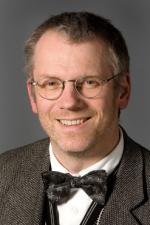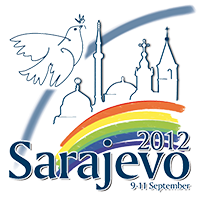
Journaliste, “Frankfurter Allgemeine Zeitung”, Allemagne
|
Last Wednesday, on my way into senior editors’ morning meeting, a colleague from the news team came towards me and asked me if I could make a short assessment of the state of affairs on ecumenism. What occasioned his request was an appeal by outstanding Catholic and Protestant politicians and public figures to give a new impulse to ecumenism; you may have read about this appeal. No sooner said than done: Even while I was talking with my colleague, I remembered an ecumenical document that was signed eleven years ago and which was supposed to become a milestone of ecumenism in Europe. But it has never become this milestone, until today.
It is the so-called “Charta Oecumenica”, signed, in the name of the Conference of European Churches (CEC), by the then Swiss Metropolitan Jérémie, and, in the name of the Council of European Bishops’ Conferences (CCEE), by Cardinal Vlk, the now emerited Archbishop of Prague. I do not want to bore you with the content of the whole Charter and request you to believe my summary evaluation that the fate of this charter was that of many other documents, namely that they were and are not worth the paper that they are printed on.
Or have you ever heard about the CEC and the CCEE working together more intensely or that, after the European Ecumenical Assembly of Sibiu, another one has been planned? What has become of promoting dialogue between the churches and the attempts of declaring “results of dialogue to be binding for the church authorities”? And what of the self-commitment “in the event of controversies, particularly when divisions threaten in questions of faith and ethics, to seek dialogue and discuss the issues together in the light of the Gospel”?
From my horizon of experience, which is mostly limited to Germany and Western Europe, I can assure you that all this has not taken place between Protestants and Catholics for a long time. In bioethical questions, the heads of the Churches and the specialized theologians now often speak in so very different languages that the Churches themselves reduce all talk of a “Christian idea of the human person” to absurdity. For what should one think of the idea of the human person which does not make it sufficiently clear whether God the creator is happy with embryos being generated and killed for the purposes of stem cell research? The list of points of dissent could easily be extended, one of the items on it would be the ethical assessment of homosexuality.
I mention this because I want to begin my reflections with the assertion that, in times of the crisis of Europe, it is cheap to present politicians as incapable or obsessed with power, nations as selfish or presumptuous, the banks and international financial markets as greedy and irresponsible and so on…
I do not want to deny that things are this way. But if it is true what Joseph Cardinal Ratzinger said, namely that Europe “precisely in the hour of its most extreme success, became empty from within”, then I tend to apply this sentence not least to the Europe of the Churches, which have not found a common language, neither on the inside nor on the outside, and in which many mental and cultural borders continue to exist, just as if the European unification of the recent years had only been a project of secular elites and not also a project of the Christians, which it had been in the beginning.
Of course, I do not want to deny the many good things that Christians even today are doing in Europe and for Europe. For instance, Renovabis, the solidarity initiative of German Catholics for Central and Eastern Europe, supports numerous projects year by year in the countries that once were behind the Iron Curtain. And the sole fact that the peace meeting of the Community of Sant’Egidio is taking place in Sarajevo this year might give reason to hope that the times of war will never return.
But who could have suspected, in the middle of the 1980s, that the story of Yugoslavia falling apart would be written with blood, whereas the transformations of the countries in Central and Eastern Europe would take largely without bloodshed? And who could have predicted only a few years ago, precisely before the outbreak of the economic and financial crisis of autumn 2008 that, within the middle of Europe, trenches would open again that we believed had been buried irrevocably under 50 years of history of European unification? My Germany gearing up to take European hegemony?
At least, no military alliances are forged against this Germany any more. But – to adapt Cardinal Ratzinger’s words from 2004 – hasn’t Europe become so empty from within precisely in the hour of its most extreme success, namely monetary union, that this union must fail because of the imbalance of economic situations and social systems, and threatens to tear down in its fall the work of unification that two generations built up?
Still, you will forgive me if I say that the situation in Europe is about anything but a war of Germany against all others, or of all others against Germany? Or should Estonians and Slovenes, with their modest wealth painfully acquired after 1999, finance and maintain the state of Greece, which, after the parliamentary elections, created 50,000 so-called positions in civil service, and which still affords a shamelessly oversized army, which, unfortunately, can hardly contribute at all to the spending cuts.
Now, more competent speakers than me may talk about the economic and political dimensions of the state debt crisis. Instead, I want to focus your attention again on Ratzinger’s alias Pope Benedict XVI’s statement: With “becoming empty” he also meant, beside the inner withering away of the supporting spiritual forces, the physical emptying of the continent because it has the lowest birth rates worldwide. This meant, said today’s Pope, that “Europe is already on its way saying goodbye also from an ethnical point of view”.
There is no doubt about this diagnosis, although one should be careful not to abuse this quotation to justify xenophobia. What Cardinal Ratzinger meant was something different: Nowhere in the world are the birth rates as low as in Europe, especially in the Romanic and Catholic countries of the Mediterranean, nowhere does life expectancy decline faster than in Russia, where alcoholism and violence are ruining a whole society, a development that began even before the fall of the Iron Curtain.
However, one should be careful to avoid a misunderstanding: Sinking birth rates especially in Southern Europe, against the backdrop of social upheavals connected with the economic and state debt crisis, could be interpreted as an expression of a lack of confidence in the future, or even as a phenomenon of poverty. However, the opposite is true: The birth rates have decreased the more wealth increased, reproduction and sexuality were decoupled and the emancipation of women found its aim in becoming equal to men in their fixation on self-realization in paid work. It would be naïve to wish for a return to the status quo ante. Indeed, it is not clear that the status quo ante is even desirable.
So what can the talk of a “rebirth of Europe” mean? If you permit, I will advocate the idea that the rebirth of Europe begins with more men and women deciding to promise each other, trusting in God’s help, to love, respect and honor each other, which means to get married, and to pass on the gift of life as man and wife. Rebirth, quite banally, means more births.
If the rebirth of Europe begins with “more births again”, this does not mean at all that this is all that is needed for it.
Another element of rebirth, to my mind, is agreeing on what kind of Europe is actually meant, what kind of Europe should be worth being born again. It certainly cannot be the Europe where two world wars began, nor the one in which the European powers were unable or unwilling to prevent the bloodshed on the Balkans.
However, it can neither be a Europe that, through a kind of displacement activity, declares European everything that wants to be European. “Europe” has been and is, not a geographical but a cultural and historic term. It only prevailed as a term of self-description during the attacks of the Ottoman Empire in the Early Modern Age.
But what, then, is this “European” idea that has developed and asserted itself for example in contrast to cultures marked by Islam? Some points could be cited, for example the separation of Sacerdotium and Imperium, the separation of law and morality, and also the separation of powers. But mind you – it is only, and at best, the Latin West of Europe that is European in this sense. In the East, even today, the clocks are ticking at quite a different pace.
So what is to be done? There cannot be a master plan for “the rebirth of Europe”. But it would be a great achievement if it could become possible to talk about Europe in other terms than acronyms such as ECB, ESM, EFSF or in categories like spreads or Eurobonds. For my generation, and even more so for that of my parents, Europe has always been the promise of a peace which my grandparents’ generation, just like most all previous generations, was never able to experience. And a peace that can still not be taken for granted in most regions of the world.
This peace – and not prosperity alone – must be consolidated again and again. And this must also take place in the coexistence of people of different religious convictions and colors of skin right here in Europe. The Churches can and must contribute to this more than all other institutions. They committed themselves to this, and to many other things, eleven years ago in the Charta Oecumenica. This is where I make my proposal: Rebirth begins not by seeking but by finding rebirth – the most important things have long been said, and is far from being realized. For example by following the maxim that it is not common action that needs to be justified, but separate action. This could also be a good maxim for the community of European states and peoples, couldn’t it?
|

